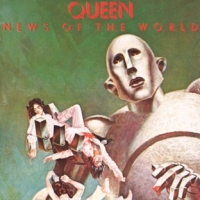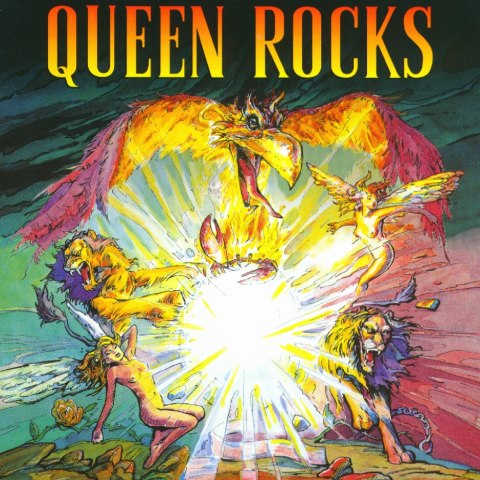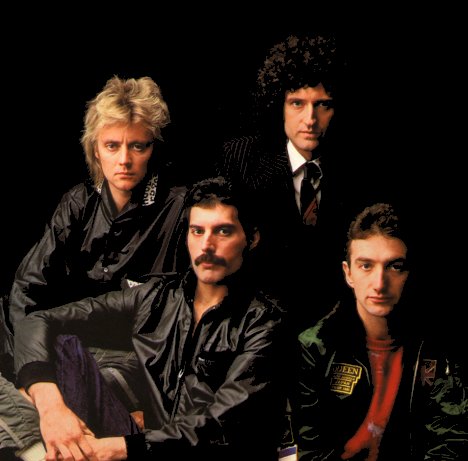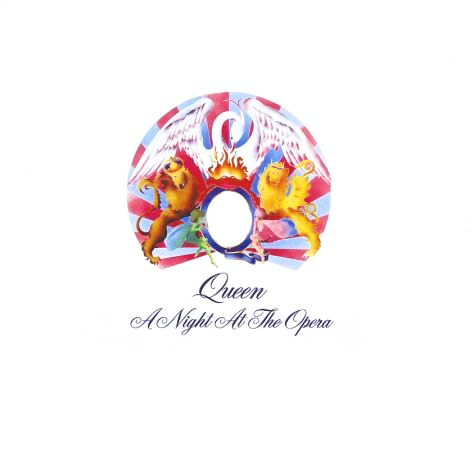12-24-1977 – BBC Radio One
Tom Browne: Hello there. Radio One proudly presents in two programmes, the members of Queen talking about themselves and their music. Queen as they are now were formed in February 1971 and have become one of the most successful rock acts in the world. With six major albums and ten hit singles. Well let me introduce you now to the members of Queen. First of all, vocalist and piano player?
Freddie: Freddie Mercury? hahaha.
Tom Browne: On guitar and arranging and writing?
Brian: Brian May, I’m here.
Tom Browne: On drums?
Roger: And occasional vocals, Roger Taylor.
Tom Browne: Welcome Roger. And on bass and electric piano?
John: Erm, John Deacon.
Tom Browne: Right, together they’ve sold over 40 million records worldwide, that’s quite something. First of all, let me ask you Freddie, how did it all begin?
Freddie: Very briefly, Brian and Roger were in a very up tempo raucous band called Smile and I used to be in another band called Wreckage or something?
Roger: Even more up tempo with a name like Wreckage!
Freddie: Even more up tempo, and we used to be friends, going to collage together and met up. After the first couple of years knowing each other, we decided we’d form a band together and it’s as simple as that. We thought our musical ideas would blend. Then we met John and decided to call the band Queen.
Tom Browne: Roger, can we go to the beginnings of the group. You and Freddie were working on a stall in Kensington market?
Roger: Ah yes, partners in crime. Yes it was really a social centre at the time. At the time when Queen were at its formative stages, we were going through all the traumas with trying to find somebody to manage us and find a record company etc. We slogged our way around, made some demo tapes etc, through some friends and hawked them around the business as it was and still is. Eventually securing ourselves with several companies that were interested. We did a gig I think, was King’s Collage, somewhere down South London and got a lot of record companies along. We started to try and wheel and deal a bit in a way into a good recording situation.
Tom Browne: How long did it take you from the time that you made the demo, to the time that you actually got a recording contract?
Roger: It felt like about 80 years..!
Brian: It was about two years?
Roger: Yeah, about 18 months – two years yeah.
Brian: There was a great dealing of frustration at the time. The first album was really old songs by the time it came out, as far as we were concerned. It puts us in a strange position. We were one of the groups that came along with a show and an idea of a complete production with the stage show and everything. Which by the time the record came out and particularly by the time it got played by everyone like all this, as it takes so long to get things all going. It was all sounding like old news, people were inclined to tag us as the tail end of ‘Glitter Rock’ or something.
MODERN TIMES ROCK & ROLL
Roger: The erm, fairly sour relationship with the music press as it’s called in this country.
Tom Browne: You don’t like the music press?
Roger: No, to be perfectly honest no!
Tom Browne: Hahahaha!
Freddie: From the very beginning, as far as the music press are concerned, they like to put up and coming bands into a particular bag, to what they think, and we just rebelled and wanted to do what we thought was right and not go along with what they were saying. Since the early stages, there’s always been this fracas.
Roger: Yes, from day one with the release of our first album. Plus the fact that before our actual release, we were virtually totally unheard of. Then, suddenly we were – not particularly famous, but heard of at least and they always like to think that they’ve got one up on you and like to think that they’ve predicted something. Then all of a sudden there we were and we were playing to an awful amount of people. It took people father by surprise I think. Tom Browne: Was the style though which you created, was that thought out from the outset, or did it just evolve as time went by?
Brian: There were certain ideas which we had in our heads, certain patterns that we wanted to try and live up to. And I think, to put it crudely. We started off thinking we’d be a kind of heavy group, but with good melodies and harmonies and the other things grew out of that. The first album was really just putting down what we did on stage at that time. It was quick into the studios and quick out. Even at that time, lots of big ideas were about what we could do in a studio if we were let loose with the proper time in the studios. We saved all that up for “Queen 2”. But a lot of “Queen 2” stuff was written at the time we made the first album.
Tom Browne: Ok, take some music now from “Queen 1”. The first track that we’re going to play was in fact your first single taken from “Queen 1” it’s called “Keep Yourself Alive”.
KEEP YOURSELF ALIVE
Tom Browne: The single Brian, were you disappointed that this didn’t do better?
Brian: Oh yes, it takes me back very vividly to the time actually because this is just the time when we started. We did a few gigs on our own, some small gigs. Then went onto support Mott the Hoople and went around the whole country getting some really good reactions. Thinking ‘yeah, we’re finally getting somewhere’, and all the time watching the single and album and nothing appeared anywhere in the charts. And it just seemed like an impossible wall, how con it be done? We couldn’t get the single played on the radio at all. There were a couple of people playing it, but it didn’t get any power playing. There’s no doubt that the beginning is the worst. You’ve got no track record, no reputation.
Tom Browne: John, can I come to you now, we haven’t heard from you I’m sorry. You’ve got a degree in electronics. Did this mean that the group would come and ask you questions when they had complicated bits of machinery to look at?
John: Not particularly, I used to help out in the early days when we all started out, just the four of us and our roadie John Harris who’s been with us right at the beginning. Between me and him we used to a lot in the early days. But now we have a larger crew of about twenty who look after it all for us.
Tom Browne: Well being in a pathetic two track studio with all this marvellous space age electronics around, do you find it difficult to keep your hands of little buttons and saying ‘What’s this, what’s that’? John: We do, all of us try and learn what the studio does because that helps to get the sounds and ideas and to do what you want. And we’ve all taken interest in what it is possible to do in a studio technically. I mean, if a musician doesn’t know how to do that, then it limits their put down on tape.
Tom Browne: Now?you were playing bass, first of all with Roger?
John: No, I came down to London and was down here for two years and wasn’t playing at all. I used to play before I came to London in groups in school and gave it up when I came down. And after I was down here for about two years I bumped into Roger and Brian and I heard socially because they were playing in the same collages around London. I heard that they were looking for a bass player and I said I was interested, and went along for an audition and it happened like that. I think you’d been together for about six months previously hadn’t you?
Roger I think longer actually, you mean as Queen yeah? We were going through about three bass players a week actually and eventually found John.
John: And I seemed to fit in.
Tom Browne: Did you individually agree on the kind of music that you were going to play?
John: Well erm, I dunno. They were already formed and had all the musical ideas then of what they were trying to do and I just fitted in really at that time.
Brian: He’s very modest.
John: My development came later, it took me a few years to settle in.
Tom Browne: Well John, It’s your personal choice. What would you like to play?
John: Ye, I’ve chosen a track by Marvin Gaye “I Heard It On The Grapevine”. I like a lot of these American ‘Tamlor’ things, the bass players are very good and it’s a nice atmospheric song.
Tom Browne: Ok, let’s hear it.
I HEARD IT ON THE GRAPEVINE – MARVIN GAYE
Tom Browne: John, you are a family man, am I correct?
John: Yes, sort of correct yes [laughs]. I have one little boy yes.
Tom Browne: Do you find it difficult touring in the States and being away from family?
John: It can be a strain yeah, but I try and make the two work together. Which can be difficult, but I try to fit it in.
Tom Browne: How does he react to Daddy being a big star?
John: I dunno, he can’t talk yet! [All laugh].
Tom Browne: How do you think he will react?
John: I dunno, we’ll see then. He’s just starting to talk now actually, so I’ll find out what he’s been thinking.
Roger: John’s also the business brains of the group.
Tom Browne: He’s the business brain?
John: I tend to look into that a bit, yes.
Tom Browne: So you’re examining the contracts and checking the returns etc?
John: It is nice, when you get to the level that we’ve got to, it’s nice to see what’s going on.
Tom Browne: Brian, you did a degree in physics and then went on to do a PhD in astronomy. What was the attraction of astronomy?
Brian: Something I’ve always been interested in. As a kid I used to look at the stars and build a telescope and things. It was just a thought that if I ever had the chance to be an astronomer, I would give it a go.
THE SEVEN SEAS OF RHYE
Tom Browne: By the seaside? That was the single that broke you, that started it all. Roger, why was there a little bit of “Seven Seas Of Rhye” on “Queen 1” and repeated again on “Queen 2”?
Roger: Well, I think Freddie had half written the song and we thought it was a nice ‘tail out’ to the first album, with the idea of starting the second album with the song.
Freddie: With the finished?
Roger: With the finished song yeah. So we’d lead in nicely. In fact we ended the second album with this song and it had changed a little by then and we’d released it as a single because we thought it was fairly strong.
Tom Browne: Freddie if I can go to you, to the man that wrote it. The lyrics, what does it mean?
Freddie: Oh gosh you should never ask me that! My lyrics are basically for peoples interpretations really. I’ve forgotten what they were all about.
Tom Browne: What were the Seven Seas of Rhye?
Freddie: It’s really factitious, I know it’s like bowing out or the easy way out, but that’s what it is. It’s just a figment of your imagination.
Tom Browne: You have rather a surrealistic approach, is that the right word?
Freddie: An imaginative approach I think, yes.
Tom Browne: An imaginative approach, yes.
Freddie: It all depends on what kind of song really. At that time I was learning about a lot of things. Like song structure and as far as lyrics go, they’re very difficult as far as I’m concerned. I find them quite a task and my strongest point is actually melody content. I concentrate on that first; melody, then the song structure, then the lyrics come after actually.
Tom Browne: Are you influenced by Salvador Dali?
Freddie: Not really. I admire him yes, it’s not as involved as that. I don’t take things like paintings too literally. The only time I did do something like that was with a thing called “The Fairy-Fellow’s Masterstroke” in which I was thoroughly inspired by a painting by Richard Dadd which is in the Tate Gallery. I thought, I did a lot of research on it and it inspired me to write a song about the painting. Depicting what I thought I saw in it. Tom Browne: What did you discover in your research about this painting?
Freddie: It was just because I’d come through art collage and I basically like the artist and I like the painting, so I thought I’d like to write a song about it.
Tom Browne: We’re going to play this track.
Roger: It’s on “Queen 2”?
THE FAIRY- FELLOW’S MASTERSTROKE
Roger: That’s one of our first major experiments in stereo I think.
Tom Browne: Do you sort out which songs go onto an album, because you all write don’t you?
GROUP: Hmmm, yes?We row?.We argue?
Freddie: We do write individually so we go our separate ways from whenever the tour is over or whatever. Then we have a teething period when we get together and play each other the new songs. Then what happens is a huge sifting process which you find out songs.
Roger: Like, ‘No way am I going to play that’, or ‘Forget it’!
Freddie: Things like that, also as far as the individual song is concerned and also what will go with how the other songs will sound with each other. So it’s basically looking in terms of an album as opposed to just individual songs.
Roger: Yeah, we have tried in the past to provide a lot of variety in each album and a lot of contrasts and so we’ve had a good cross section of material.
Tom Browne: Alright, well let’s hear some of the heavy side of your music with “The March Of The Black Queen” from “Queen 2”
THE MARCH OF THE BLACK QUEEN
Tom Browne: Brian, you can say something about “Queen 2”
Brian: I thought it was a good idea to play that because “Queen 2” is an album which in some ways is the root of all that happened thereafter I think. And if people hadn’t heard that before, you could think that was something off the new album really. It still sounds that fresh to me and there are a lot of things you can still hear. There’s a lot of textured work with the intricate harmonies, the guitar harmonies and stuff. The pre cursor of “Bohemian Rhapsody” in many ways. So I think that was a very important album for us. It was also the first which came into the charts.
Tom Browne: How long did “The March Of The Black Queen” take to record?
Roger: Until the tape went transparent. Genuinely!
Freddie: Those were the days of the 16 track studios and we have now 24 and 32 track. Before when we did so many overdubs on 16 track. It was like, we just kept piling it on and on. It was like what Roger means, the tape went transparent because it just couldn’t take anymore. I think it snapped in two places as well.
Roger: It had gone over the heads so many times with the overdubbing, the oxide had worn off. (Sniggers).
Brian: It was a big step for us, certainly at the time because no one was really doing that kind of thing in those days.
Roger: In fact when this album came out, we were doing our first headlining tour. After supporting Mott The Hoople and gaining an enormous amount of live experience and a large following really. For a relatively new band.
Tom Browne: So Roger, you went on to support Mott The Hoople in the States, right?
Roger: Yeah, it seemed the logical step, because it had worked so well and we got on with them so well with them personally as well. Which doesn’t always happen to us. It’s always good when the bands touring together do get on well. And we really took the logical step and went to America with them as well. We did learn quite a lot from them, they’re a really good live band.
Brian: Excellent live band, yeah.
Roger: We had a very good American tour up to the point when Brian got Hepatitis and collapsed and we had to come home. At which point things looked very black. (Laughs)
Tom Browne: You then did an extraordinary thing, having supported once in England and having supported once in the States. You then went to headline straight away in England and you then went and headlines straight away in the States.
Roger: It was quite rare then yeah, because we did go to playing The Rainbow by ourselves in one sort of step.
Freddie: We did take a lot of risks actually and I think most of them paid off.
Roger: Yeah, most of them.
Tom Browne: In the States, you got yourselves an American manager.
Roger: We already had him in fact. He was taken on by Trident, who was the company which we were signed to at the time. A production deal. I think he helped in many ways in our induction to America, being a yank. He’s from California.
Freddie: Basically, I think we’d signed all the recording deals and publishing deals. So in effect we were signed to Trident and at a later stage Jack Nelson came in (the person we’re talking about), came in to look after the management side of things. So he was brought in at a later stage.
Brian: To make it a little clearer. When we came to the point of signing the record contracts, there were a couple of record companies that were interested. But instead of doing that, we signed to a production company. And the deal is; you record for them and they do a deal with a record company. So you’re a kind of ‘middle man’ and Trident were this ‘middle man’.
Roger: At the time it seemed a good idea because, an established company, a fairly high power established company seems more able to deal with the fairly high power record companies, than mere novice humble musicians.
Brian: There is always a huge basic drawback in the fact that your manager is then your record company. And you don’t have anyone that can represent you to the record company. So you have an impossible situation where it’s basically the band against everyone else. And it generated friction in every department.
Tom Browne: Alright, we now come onto your third album “Sheer Heart Attack” and the biggest hit from that which went to number 2 in November 1974 was “Killer Queen”.
KILLER QUEEN
Tom Browne: A lovely lady of your acquaintance then?
Freddie: No, another fictitious person.
Tom Browne: I mean there’s wonderful lyrics, there’s; ‘Dynamite with a laser beam, guaranteed to blow your mind’. ‘Gunpowder gelatine’. marvellous stuff. And we’re not getting any clues to this society (laughs).
Freddie: I think if I was to analyze every word, it would be very boring for the listeners and it might shatter a few illusions. I’d rather sort of keep it.




